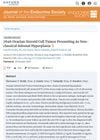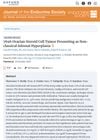 34 citations,
January 2008 in “International Review of Neurobiology”
34 citations,
January 2008 in “International Review of Neurobiology” Epilepsy and certain epilepsy drugs can lead to reproductive problems in women, but changing medication might improve these issues.
 20 citations,
April 2006 in “Dermatologic Clinics”
20 citations,
April 2006 in “Dermatologic Clinics” Antiandrogen therapies are beneficial for treating skin and hair conditions related to androgen levels.
1 citations,
February 2016 in “Cell Transplantation” Hair follicles have a more inactive cell cycle than other skin cells, which may help develop targeted therapies for skin diseases and cancer.
 42 citations,
July 2015 in “Journal of The American Academy of Dermatology”
42 citations,
July 2015 in “Journal of The American Academy of Dermatology” The conclusion is that oral contraceptives and antiandrogens can treat hirsutism and acne in women with cutaneous hyperandrogenism, but more research is needed for effective treatments, especially for hair loss.
 23 citations,
April 1999 in “The Journal of Clinical Endocrinology and Metabolism”
23 citations,
April 1999 in “The Journal of Clinical Endocrinology and Metabolism” All treatments reduce hair growth; low dose flutamide most effective with fewer side effects.
 113 citations,
April 1999 in “The Journal of Clinical Endocrinology and Metabolism”
113 citations,
April 1999 in “The Journal of Clinical Endocrinology and Metabolism” Cyproterone acetate-estrogen most effective for hirsutism, but consider side effects and patient needs.
 118 citations,
September 2004 in “Clinics in Dermatology”
118 citations,
September 2004 in “Clinics in Dermatology” Hormones, especially androgens, play a big role in acne, but most acne sufferers don't have a hormone disorder. Hormonal treatments, including birth control pills, can be very effective for women whose acne doesn't improve with regular treatments.
 45 citations,
January 2013 in “Journal of Human Reproductive Sciences”
45 citations,
January 2013 in “Journal of Human Reproductive Sciences” Women with PCOS are more likely to have fatty liver disease, especially if they have metabolic problems.
 February 2021 in “Endocrinology, diabetes & metabolism case reports”
February 2021 in “Endocrinology, diabetes & metabolism case reports” A postmenopausal woman's excessive hair growth and hair loss were due to a non-cancerous ovarian condition, treated successfully with surgery.
 March 2024 in “BMC cancer”
March 2024 in “BMC cancer” High levels of ST14 and TMEFF1 proteins in ovarian cancer are linked to worse patient outcomes and may be a new treatment target.

PCOS is a common hormonal disorder with symptoms like irregular periods and excess hair growth, managed with lifestyle changes and medications.
 19 citations,
January 2015 in “Indian Journal of Dermatology”
19 citations,
January 2015 in “Indian Journal of Dermatology” Skin changes in women with PCOS are mainly due to hormonal imbalances.
3 citations,
May 2002 in “PubMed” The document concludes that treatment for excessive hair growth depends on the cause, with options including hair removal methods and medications like anti-androgens or insulin-sensitizing drugs.
11 citations,
July 2019 in “International journal of women’s dermatology” Certain skin conditions in women are linked to higher risks of metabolic syndrome and type 2 diabetes due to hormone imbalances.
 November 2004 in “Medical Journal of Indonesia”
November 2004 in “Medical Journal of Indonesia” Hormonal imbalances can cause skin and hair problems in women, and treatments that block male hormones can help.
 8 citations,
January 1996 in “Gynecological Endocrinology”
8 citations,
January 1996 in “Gynecological Endocrinology” Cyproterone acetate is the preferred treatment for women's hyperandrogenism when estrogen/progestogen use is safe.
 2 citations,
January 2011 in “Elsevier eBooks”
2 citations,
January 2011 in “Elsevier eBooks” Early treatment of acne is crucial to prevent scarring and psychological effects.
 60 citations,
October 2014 in “Journal of the American Academy of Dermatology”
60 citations,
October 2014 in “Journal of the American Academy of Dermatology” Dermatologists play a key role in treating skin symptoms of PCOS like dark patches, excess hair, acne, and hair loss.
 378 citations,
November 2011 in “Human reproduction update”
378 citations,
November 2011 in “Human reproduction update” Experts recommend using evidence-based methods to diagnose and treat hirsutism, focusing on symptoms and underlying causes.
December 2023 in “Acta dermato-venereologica” Metformin might help treat certain skin conditions, but more research is needed.
 29 citations,
October 1988 in “Journal of Steroid Biochemistry”
29 citations,
October 1988 in “Journal of Steroid Biochemistry” Antiandrogens are effective for conditions like prostate cancer and skin issues, but more research is needed to confirm their benefits and minimize side effects.
 6 citations,
July 2013 in “Acta Clinica Belgica”
6 citations,
July 2013 in “Acta Clinica Belgica” The document concludes that combination therapy is most effective for treating excessive hair growth in women with idiopathic hirsutism, and more research is needed to understand the condition.
 October 2024 in “Journal of the Endocrine Society”
October 2024 in “Journal of the Endocrine Society” Ovarian steroid cell tumors can mimic adrenal hyperplasia, and surgery can normalize hormone levels.
 October 2024 in “Journal of the Endocrine Society”
October 2024 in “Journal of the Endocrine Society” Early detection of ovarian steroid cell tumors is crucial to prevent lasting symptoms.
 January 2024 in “Journal of surgical case reports”
January 2024 in “Journal of surgical case reports” Removing an adrenal tumor can significantly reduce high androgen levels in postmenopausal women.
 October 2024 in “Journal of the Endocrine Society”
October 2024 in “Journal of the Endocrine Society” Leydig cell tumors can cause high testosterone and symptoms like hair loss in postmenopausal women, but surgery can improve these symptoms.
 42 citations,
April 2013 in “Steroids”
42 citations,
April 2013 in “Steroids” Non-classic congenital adrenal hyperplasia is a common disorder causing symptoms like acne and infertility, and it's managed based on symptoms, not just test results. Treatment can improve fertility and reduce miscarriage risk.
 May 2021 in “Journal of the Endocrine Society”
May 2021 in “Journal of the Endocrine Society” A rare ovarian cancer with a good outlook was found in a woman with unusual hair growth and abdominal symptoms.
 45 citations,
January 2006 in “Endocrine journal”
45 citations,
January 2006 in “Endocrine journal” To diagnose Polycystic Ovarian Syndrome, two out of three signs—irregular periods, high male hormone levels, or cysts on the ovaries—are needed.
 13 citations,
June 2021 in “Carcinogenesis”
13 citations,
June 2021 in “Carcinogenesis” Certain hair straighteners and dyes may increase ovarian cancer risk, especially in African American/Black women.


























